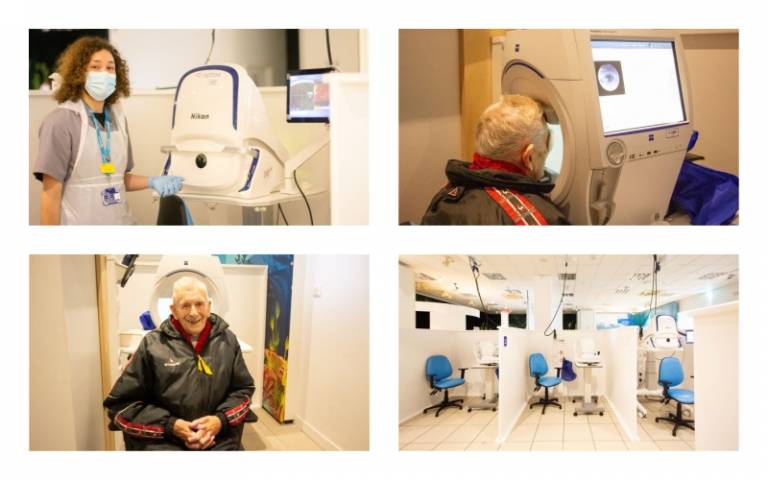A new pop-up diagnostic hub has been opened at a London shopping centre in a unique research collaboration between UCL and Moorfields Eye Hospital, aimed at "defining the principles of healthcare in the UK and globally for the next 50 years".

The new eye clinic, based in a retail unit at Brent Cross, has been designed by a team of UCL architects and scientists led by Professor Paul Foster (UCL Institute of Ophthalmology), and is part of a NIHR-supported research project.
Its location enables some people to be seen closer to their homes, providing a convenient way for them to access diagnostic eye care.
On entering the hub, patients will have a series of high-tech eye tests in an environment that takes its inspiration from high-efficiency commercial settings such as automotive and aerospace manufacturing. At all times patients will be socially distanced, have far fewer interactions and spend less time indoors - reducing the chance of transmission of Covid-19 and other viruses.
Over the next few months, the pop-up clinic will be reconfigured several times using UCL-designed moveable 'smart' walls and floating electrical and data 'umbilical cords'. The aim is to establish the most time-efficient and cost-effective layout for patient throughput. An innovative 'eye-pod' will also be studied, in which patients will sit and rotate to have tests on different pieces of equipment in a secure, light- and sound-controlled environment.
Researchers at UCL and the NIHR Biomedical Research Centre [BRC] at Moorfields Eye Hospital NHS Foundation Trust and UCL Institute of Ophthalmology, will use high power computing to analyse and optimise these patient pathways and centre layout.
In the future, these flexible and mobile 'diagnostic centres' could be deployed rapidly, including during a pandemic and the recovery from it, or used for monitoring early phase trial participants. They could be also applied to any healthcare specialty, such as cancer and cardiac screening.
The overall aim of this project is to pioneer new ways of providing healthcare, taking patients through a series of tests rapidly, aiming to complete these within 45 minutes or less. Each patient's results are then individually reviewed online by consultants and their teams. Patients will receive a letter informing them of the outcome of their tests, while some will also be offered a video or phone appointment to discuss particular results. Patients will only be asked to attend a follow-up hospital visit if the consultant sees something requiring urgent or in-person attention.
In designing the innovative hub, researchers intend to deliver a model that is the most cost-effective, equitable and sustainable.
Other community-based diagnostic hubs have been developed by Moorfields and have been included in NHS England and Improvement's National Eye Care Recovery and Transformation programme.
Project lead, Paul Foster, a Professor of Ophthalmic Epidemiology and Glaucoma studies at UCL Institute of Ophthalmology and consultant at Moorfields said: "This important innovative eye clinic, builds on the decade of research that led to the earlier Moorfields' diagnostic hubs.
"Through rigorous research, patient feedback and expert evaluation, we aim to provide data on how to create outpatient diagnostic hubs that are user-friendly, time efficient and socially distanced. This work will help define the principles that will shape healthcare in the UK and globally for the next 50 years."
Research at the Brent Cross hub is supported by the NIHR Biomedical Research Centre at Moorfields Eye Hospital NHS Foundation Trust and UCL Institute of Ophthalmology, The Bartlett, UCL's Faculty of the Built Environment, UCL School of Management, UCL Department of Applied Health Research, Moorfields and industry.
Louisa Wickham, medical director at Moorfields, said: "As well as providing an innovative new way to assess and monitor patient's eyes, we hope the research work at Brent Cross will allow us to see even more patients. As diagnostic hubs are adopted more widely across the NHS, this has the potential to help the NHS to reduce waiting lists."
Dr Hari Jayaram, NIHR Moorfields BRC, added: "For this unique study, we have the benefit of architects, healthcare researchers and operational experts, to help us trial and test a new generation of outpatient clinics.
"We hope this bespoke design will end the need for waiting rooms, further reduce the time patients spend in a clinic, while also building in social distancing measures.
"The hubs' movable, flexible and sustainable nature also means they could be rapidly deployed and expanded to help to reduce ongoing NHS backlogs and boost capacity in the event of a future pandemic."
Patient experience
John O'Grady is an 89-year-old retired insurance agent from Stanmore. He has been a glaucoma patient at Moorfields Eye Hospital for five years. Comparing his experience at Brent Cross with previous diagnostic testing, he said: "It was such a quick service, I've not had to wait. Before, the tests could take hours, this has saved me lots of time."






